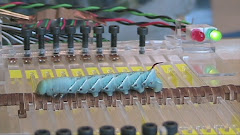Ok, between posts of robotics, I'm going to risk my neck and touch on the famous American debate on Intelligent Design vs Evolution. Since I'm not only a physicist but also a biologist, my position is hard to be neural. Thus I decide to speak in the context of robotics only.
Robotics is a multi-disciplinary engineering by itself. A roboticist not only need to know mechanical design and to be familiar with materials, but also need to understand control strategies and to learn electronic interfacing. It is an integrated system design process. All robotic systems must be designed through our superior intelligence then. Is there any question?
More recently, the Genetic Algorithm (GA) approach to engineering optimization became very popular. The idea is that by introducing variations similar to mutation in a model, we could come up with very unintuitive solutions quickly. This approach can be very powerful for complex systems, which we don't fully understand. Some people start put much hope on this especially in tough engineering problems.
Being a philosophical person, I ask: is there a fundamental difference between human intelligent design and an optimization process such as GA. The working behind GA is try-and-error via simulation. Now let's analyze the process of engineering design to find out how it could be different.
First of all, I would like to quote a saying in the community of mechanical engineering: "you design by intuition, model for conscience, or don't model at all." In many well-designed human artifacts, there was no modeling involved during the designing process. Often times, the designer "simply knew" what would be a better configuration without knowing exactly why. And this knowledge came from experiences. These experiences include personal observations, hands-on works, conceptual reflections, and communication with others. Our engineering knowledge is not legislative. We often go with rules of thumb.
Secondly, the key to good engineering is to build a good sense of physics. In fact, personal observations and hands-on experiences provide physical episodes of how things work. Then conceptual reflection and communication setup virtual simulations of physical systems in our brain. Every good engineer has a physics engine inside hisz/her brain working out solutions by simulating ideas. And the predictive power of this simulator is directly proportional to experiences and our understanding of physics.
Finally, we call our ability to create and design “intelligence”! This ability is how we can determine what could work and fail without actually building the entity. In the ultimate sense, it is our ability to simulate different situations in our brain quickly and come to a good but non-perfect decision. We can avoid physical try-and-error because we did that quickly in our mental simulator. We can often skip many unnecessary simulations because we remember the results from similar episodes before.
Now, let me come back to my question: is there a fundamental difference between human intelligent design and an optimization process such as GA? The difference can only be in the processing units. While we simulate with biological neural networks, GA relies on computers and programming. For a robot, designing a locomotor gait is the same as evolving one. The only difference is brain vs. computer algorithm. So if you can build a computer that interprets our physical understanding well for the system of interest, then robot evolution by GA saves your brain labor. Otherwise, human design and try-and-error is more efficient. We teach computers how to “think” remember?
This is how I solve the question of Intelligent Design vs. Evolution in robotics by arguing their equivalency, or how I create a debate with my radical views.
Subscribe to:
Post Comments (Atom)

.jpg)
No comments:
Post a Comment